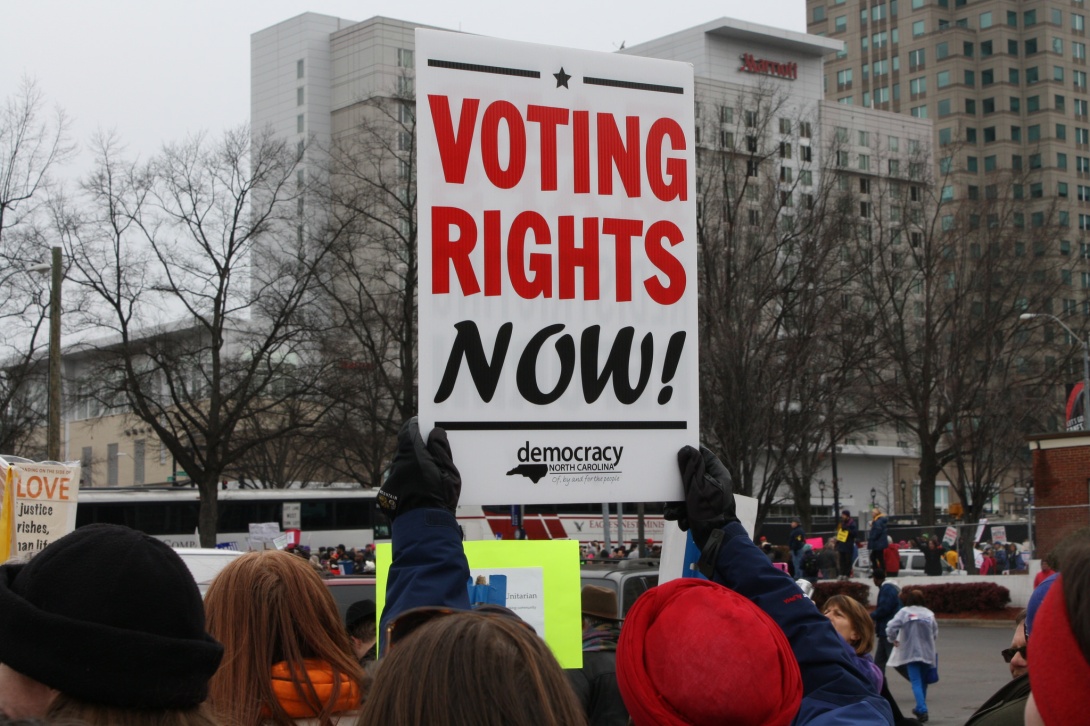Amid concerns of intimidation, voting rights advocates to monitor polling places

Moral Movement marchers in North Carolina called for voting rights protections after the state dramatically changed its voting laws in 2013. Concerns about voting rights in Southern states were heightened after Republican presidential nominee Donald Trump called on his supporters to watch for voter fraud at the polls, despite no evidence of widespread fraud. (Photo by alexmh17 via Flickr.)
As he's fallen behind in the polls, Republican presidential candidate Donald Trump has stoked concerns of a "rigged" election and called on supporters to watch for voter fraud. In a speech in Pennsylvania back in August, he encouraged supporters to show up at polls in "certain areas" to make sure "people don't come in and vote five times."
While Trump's allegations of election rigging are not based in fact and have been countered by many including state Republican leaders in Florida and Kentucky, the threat of voter intimidation created by his claims is a real concern. It's especially alarming in Southern states where 2016 marks the first presidential election in 50 years without the full protections of the federal Voting Rights Act (VRA) as a result of the Supreme Court's 2013 decision gutting key provisions of the law.
In response, the U.S. Justice Department and voting rights advocacy groups are dispatching their own poll monitors to ensure eligible voters are not discouraged from voting.
The VRA was passed in 1965 to eliminate the many barriers, obstacles and blatant intimidation black voters faced in the Jim Crow South. In addition to poll taxes and literacy tests that limited their ability to vote, black citizens often faced threats of violence as they registered voters and tried to cast ballots.
After coming home from fighting for his country in World War II, for example, Medgar Evers, the civil rights activist and NAACP leader later murdered in Mississippi in 1955, was among those turned away from the polls. According to an account included in "Eyes on the Prize: America's Civil Rights Years, 1954-1965," Evers and other black citizens were headed to vote in Mississippi when they were confronted by a mob of whites carrying guns and knives.
"We knew we weren't going to get by this mob," Evers told a reporter at the time. The group left without casting a ballot.
'Ballot security'
While the VRA prohibited overt voter discrimination, more subtle intimidation tactics to block black voters and other historically disenfranchised groups have persisted over the years.
In the 1980s, for example, the Republican National Committee ran various "ballot security" programs that were challenged in court as racially discriminatory and ultimately led to the RNC signing a consent decree to say they would not run such programs in the future.
Garrett Epps at The Atlantic summarized the tactics that were used by the RNC, including:
… posing as law-enforcement officers and demanding voters' IDs, sending out intimidating mailings to minority voters, posting misleading or intimidating signs, or standing at the polls to challenge minority voters' rights to a ballot.
The RNC consent decree is set to expire in 2017 unless it violates the agreement before then, which would result in an eight-year extension. This week, the Democratic National Committee charged that the RNC's coordination with the Trump campaign, which has called for poll watcher vigilance, is a violation of that agreement.
In more recent years, independent groups have taken up the banner of combatting alleged voter fraud. In 2009, a project called True the Vote emerged out of the local Tea Party group in Harris County, Texas. The group grew from a 1,000-volunteer poll watching effort in a single county in Texas that year to a network of groups in some 35 states across the country in 2012.
The group's national election coordinator, Bill Ouren, told volunteer recruits in Boca Raton, Florida, in 2012 that their goal was to make voters going to cast their ballots feel like they're "driving and seeing the police following."
Countering voter intimidation in 2016
It's yet to be seen how anti-voter fraud efforts may impact people's ability to cast their ballot this year. The Trump campaign has put out a call for volunteers to become "Trump Election Observers," though it's unclear how organized the effort is.
True the Vote has released a smartphone app called VoteStand for users to report instances of alleged voter fraud. And the Huffington Post found that an anti-voter fraud group called Vote Protectors briefly had a website that allowed their volunteer poll watchers to upload photos and create official-looking badges. The group has since taken the site down.
In response, voting rights advocates have been working to increase the number of their own poll monitors to ensure legitimate voters are not turned away. Their efforts are critical given the number of confusing new voting laws that have arisen in the South.
They're also important because, as a consequence of the Supreme Court decision weakening the VRA, the U.S. Justice Department will be sending far fewer of its own federal election observers to the polls. As McClatchy recently reported:
On Election Day in 2012, the Justice Department sent 780 trained observers and department personnel to 51 locations in 23 states. In next month's election, the Justice Department can send the special observers from the Office of Personnel Management only to a handful of jurisdictions in Alaska, California, Louisiana and New York where they have been authorized by court order.
While the Justice Department still plans to send poll monitors to many states this year, those monitors will have less authority and access than federal election observers.
Meanwhile, civil rights groups that are part of the national Election Protection network led by the Lawyers' Committee for Civil Rights Under Law have geared up to send monitors of their own to the polls. They have a national election hotline for voters to call if they have any issues: 866-OUR-VOTE (866-687-8683).
Local groups in the South are also organizing poll observers, such as the Alabama NAACP.
"If we see that they have a distressed look on their face, we will go up to them and specifically ask did they have problems voting," the group's president, Benard Simelton, told the Associated Press. "Hopefully through that process we will be able to take the information and channel it to the different organizations."
Tags
Allie Yee
Allie is a research fellow at the Institute for Southern Studies and is currently studying at the Yale School of Management. Her research focuses on demographic change, immigration, voting and civic engagement.
